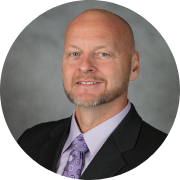

Our Instructor Spotlight is on Bob Mahler, PMP, PMI-RMP, MBA. From Bob’s time in the U.S. Special Forces to working on projects for the federal government, he brings a large amount of experience and knowledge to UTC’s Project Fundamentals course. Bob stays busy not only teaching project management but also serving as the senior director of business development for Velociteach (and working as a kickbox instructor).
Marah: What professional experience do you have relating to the course you are teaching?
Bob: My experience dates back to 1993 when I was in the Army as a Special Forces Communications Sergeant. My bosses would say, “Here is $5 million. Now deploy all these people and equipment into the lowlands of Kenya for 60 days,” or “Send this material to Saudi Arabia.” A lot of military operations are project management. I began my career outside of the Army in 1998 when I began my first job with Nextel (now Sprint). I managed the emergency response team’s operations. Then, I worked as a consultant and for deployments in DC where I gained a great deal of project and risk management experience before beginning my teaching career. I have always had the bug to teach, and it thrills me to be able to do so.
M: What are key concepts you would like your students to take away from the Project Management Fundamentals course?
B: The funny thing I often find is that everyone understands the concept of project management because they do it constantly in their personal life. However, they push back using it professionally because it appears to be tougher and is in a more “formal setting.” Typically, the only difference between using project management personally and professionally is the amount of money you’re able to spend. Think about it—when you’re figuring out how to cover monthly expenses and looking at bank statements, that’s procurement/budgeting. When you’re planning your upcoming vacation, that’s scheduling. When you’re looking over your shoulder in a parking lot late at night, that’s risk management. I want students to see that they already know the basic concepts, and the course will teach them what applying the concepts looks like in a formal setting.
M: What advice would you give to someone wanting to learn more about project management?
B: Project management is all about organization. That being said, it’s not about being perfect but how to take whatever you’re doing and be better. Even in our personal lives, we make changes for one of two reasons: to either move away from pain or move toward gain. Project management allows you to do so, both on a professional and personal level, in a structured, cost-effective, and time-sensitive manner. You won’t always be perfect in how you manage projects, but the key is about improving as much as possible.
M: So, besides being organized, what other qualities make a great project manager?
B: First, being proactive as opposed to reactive is always better, even in your personal life. If you respond reactively, it normally costs more.
Second, the ability to talk to people well is always helpful. On the scale of demand and ask, there are many ways to get people to accomplish tasks on projects, but not every way is beneficial. Over time, I have learned the art of effective communication with different people. Remember that it is your job to make your bosses feel okay with giving you the responsibility of spending, for example, the company’s $700 million. If you can communicate in a way that makes your bosses feel at ease with giving you that responsibility, you’ll find greater success as a project manager.
M: Who would you recommend the Project Management Fundamentals course to?
B: The course is valuable for anyone involved in project delivery processes or who wants to gauge their interest in/get an introduction to project management. As far as specific groups of people go, you should take the course if you’re in a specific project management sector such as coordination, scheduling, analytics, etc. Everyone understands their 5% of the product/service result. When you learn the other 95% of the process and see outside of what you do in your silo, your overall understanding of company objectives will be greatly enhanced. And, because you understand the broader project management picture, you’ll communicate better, reduce conflict, and save money as you waste less time. Finance folks will benefit because they can reduce problems as they build the bridge between what the project manager is trying to spend and the budget they have available to spend. I also recommend the course to executives because they are often at the 10k foot level and project managers are at the 5-foot level. When they understand the “why” behind project management, stakeholder dissatisfaction decreases.
M: What’s something fun you can teach in five minutes?
B: When I teach risk management, I do a fun “five minutes later” drill where I ask people to imagine what they would do if there was a house fire. Everyone makes it outside safely—so what will you be concerned with once you’re out? For example, I always put my keys, wallet, and my wife’s purse in a certain place every night so we can grab everything vitally important quickly in case of an emergency. It’s a fun yet impactful drill.
M: What are three fun facts about you?
B:
- Even though it was a lifetime ago, the fact that I am prior Special Forces is always interesting. During that time, I served as a communications expert on a military freefall team. I was skydiving from 18,000 feet, at 2 a.m. with 300 pounds of gear on.
- Even though I am no longer skydiving at 2 a.m., I still wake up early to teach kickboxing courses. I love being a kickbox instructor, so the 3:30 a.m. wake-up call is worth it!
- I was once chased by an elephant in Kenya on a safari. I made it back, though!
M: Is there anything else you would like to share about project management or the Project Management Fundamentals course you teach?
B: The course is great for team building, too. I incorporate interactive yet powerful small group exercises into the course. If a company sends three or four different people from different verticals within that company, we can group them together for the exercises to bridge communication and understanding gaps.
Also, everything we do in the course is reality-based. You can walk away with 10, 15, 20 things to implement within your company (as long as your company culture allows you to). The more you put into the course, the more you’ll take away!
ABOUT THE AUTHOR:

Marah Whitaker (think Laura with an M) serves as the marketing assistant for the UTC Center for Professional Education. During the workday, she spends time writing blog posts, creating content for social media, developing email campaigns, and building relationships with CPE’s customer base. During her free time, you can find her getting lost in a good book, having spontaneous dance parties, playing piano, and going to Buffalo Wild Wings on Wing Night. Professionally and personally, she aspires to live by Mr. Feeny’s advice, “Dream. Believe. Try. Do Good.” She strives to use her passions to serve others and contribute positively to the world around her.
Connect with Marah on LinkedIn.